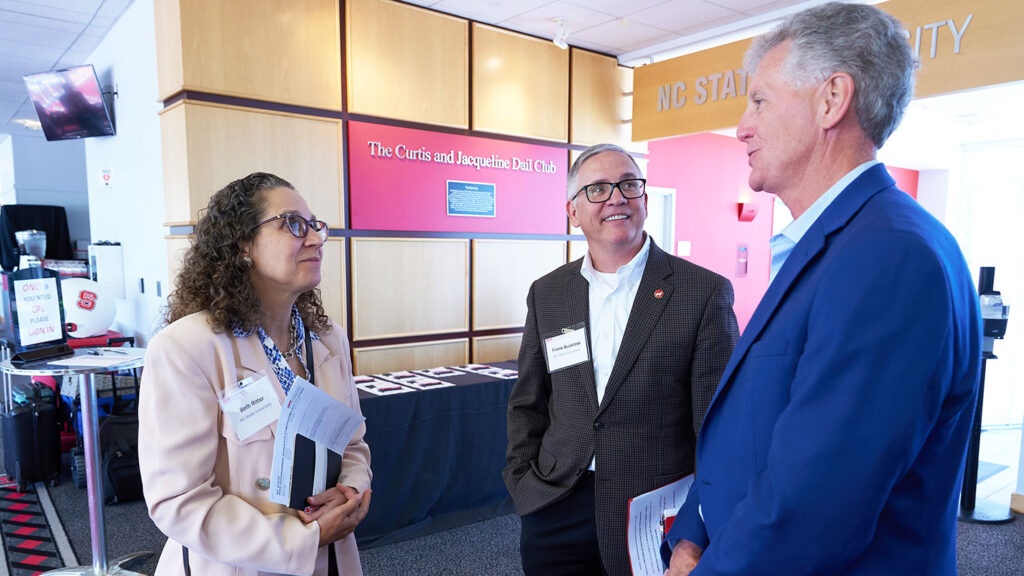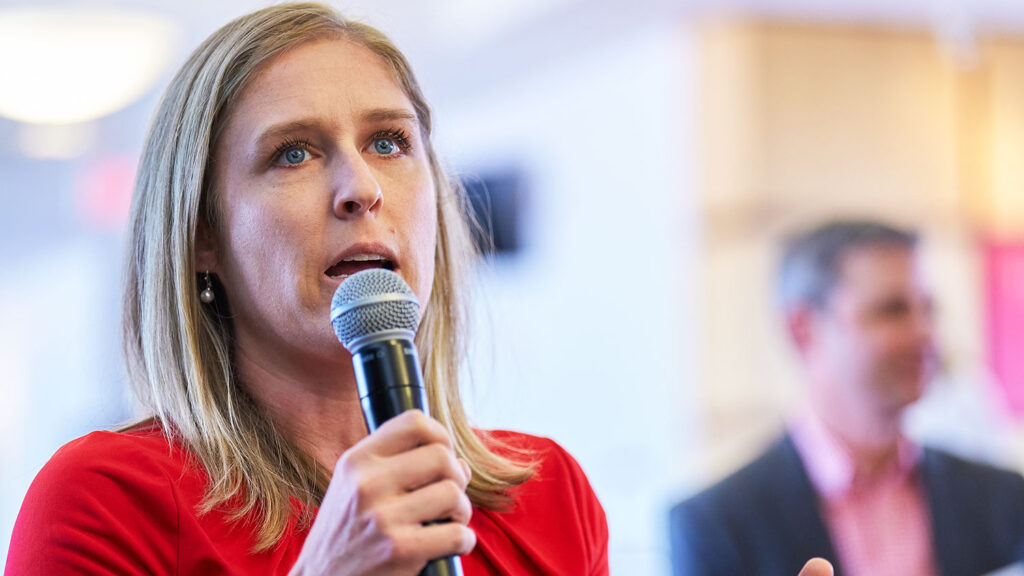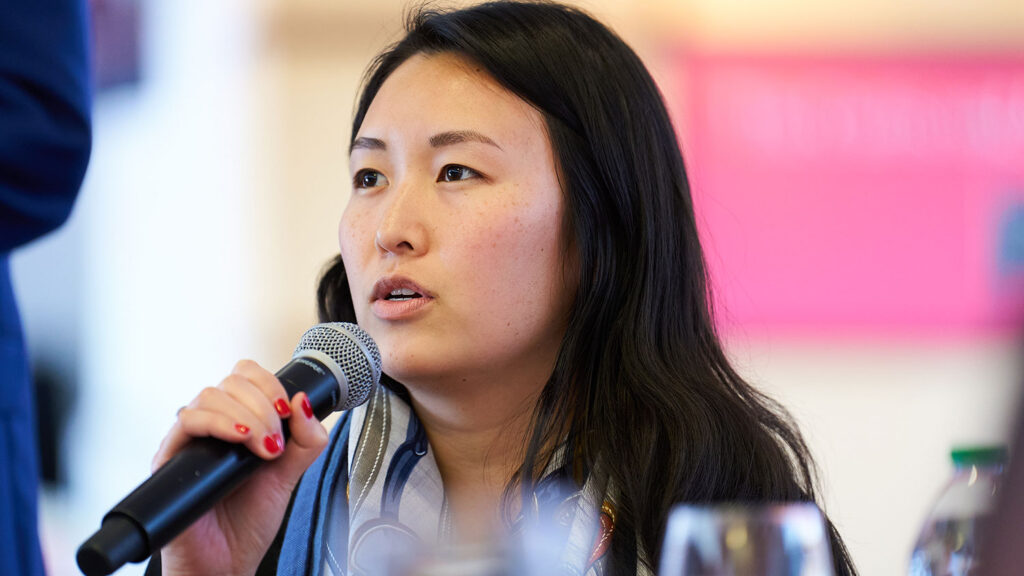ERM Initiative Launches Inaugural Risk Governance Research Symposium
Human capital, emerging uncertainties, evolving stakeholder expectations and ESG: Risk governance thought leaders discussed recent research on four key topics at ERM Initiative’s Risk Governance Research Symposium.

By Samantha Beavers
More than 70 academic researchers gathered at NC State University this spring to participate in Poole College of Management’s inaugural Risk Governance Research Symposium. Hosted by the college’s Enterprise Risk Management (ERM) Initiative, the symposium assembled scholars and practitioners from four countries and 30 different universities to present and discuss emerging research on several risk governance topics and to hear from risk governance practitioners about emerging risk governance challenges warranting further study.
Held at the TowneBank Center in NC State’s Carter-Finley Stadium, the event provided an opportunity for thought leaders to network, dialogue and share ideas to further effective risk governance.
“Our universities may be competitors down there on the field — but up here, we’re collaborators,” said Frank Buckless, Stephen P. Zelnak Jr. Dean of the Poole College of Management, to open the event. “Here at NC State, we want to make the world a better place to live and work — and one key way we do that is by interacting with partners.”
Bridging the Gap
As part of the university’s mission to Think and Do — as well as the ERM Initiative’s mission to advance thought leadership and promote best practices in enterprise-wide risk management — the symposium was designed to foster interaction between academic research and real-world practice.
For the symposium’s four sessions, a risk governance practitioner introduced each research topic by sharing real-world insights. The sessions then featured working research papers — each presented by one of its co-authors – as well as allotted time for the audience to ask questions and provide constructive feedback. Faculty members and practitioners alike weighed in by making recommendations, challenging research methods and speaking into emerging research from their unique perspectives.
“We want to be thought leaders in our fields — but we also want to put it into practice,” said Nathan Goldman, associate professor of accounting at Poole College of Management. “So, our goal was for this event to be a unique experience for our attendees.”

In total, the symposium featured nine working research papers centered on four key topics: managing human capital, anticipating emerging uncertainties, responding to evolving stakeholder expectations and navigating emerging ESG expectations.
Engaging Emerging Ideas
“Today, risk management involves so much more than legislation and the requirements of compliance — it’s about being an expert in people and culture,” said Amy Robertson, CEO of Soul Advantage, while introducing the first session on managing human capital. “We’re expected to benevolently manipulate people — from our boards down to our job applicants.”
Discussing the challenge of managing employee stress and mental health, as well as employees’ interest in working on “their own terms,” Robertson noted that leadership is key to managing an organization’s human capital risk — and emphasized that empathy and agility are the core competencies.
“Human capital risks are going to remain some of the most complex puzzles to solve,” Robertson said. “Talent by definition is human — and humans are unpredictable and risky.”
Chad Ham of Indiana University continued the session by presenting “Going Remote? The Role of Labor Market Competition,” a paper discussing employers’ decisions to disclose flexibility to work from home in their job postings and the impact of these disclosures on attracting talent. The research found that employers appear to use these disclosures as a tool to attract talent – and that employers are more likely to disclose work from home flexibility in response to labor market competition.
“These disclosures appear to be helping them with their hiring efficiency — with the caveat that we don’t know at what cost,” Ham said.
Following Ham, Ginger Scanlon of the University of North Carolina at Chapel Hill presented “Tax-Induced Organizational Complexity and Executive Performance Management,” a paper discussing the organizational complexity that would not exist in a zero-tax world and how this complexity impacts executive performance measurement.
“Tax planning is very costly to companies in terms of time and money. Therefore, research that helps us understand the potential spillover effects of tax planning on other parts of the business is vital to ensure that companies have the knowledge they need to be able to determine whether a tax strategy will add value to the business after considering all the costs,” says Christina Lewellen, associate professor of accounting for Poole College of Management.

Making Strategic Decisions
Brenda Boultwood, director of the office of risk management at the International Monetary Fund, reminded attendees that every organization has its own risk culture — and this culture informs how the organization makes decisions.
“There’s always a risk culture at play. Here at the International Monetary Fund, we do annual surveys of our staff to see how comfortable they feel taking risks, how motivated they are to take risks and whether or not they understand the consequences of failure,” Boultwood said while introducing the second session on anticipating emerging uncertainties.
Risk governance, then, doesn’t mean sidestepping every source of potential danger — rather, it means making smarter decisions with the risks involved.
“In order to make a decision, you must have choices, preferences and information. Choice just means there are options — there’s a menu of options you can choose from. We’ve formalized a concept called risk appetite, which is a mechanism for stating our preferences about our risk tolerances. And ideally, the information that determines your decisions includes an understanding of the risks of action and the risks of inaction — and some understanding of the probability of each path,” Boultwood explained.
According to Boultwood, failure should be rewarded as much as success — so long as decision-makers understand the risks at play and make intentional, strategic choices.
“This all happens in an environment called corporate governance, and that is driven by risk governance. Risk governance is ensuring your organization has owners of the risks and the controls — and that they deliberately make decisions. When you have these clear roles and responsibilities, you can also have accountability,” Boultwood said.
Driving Research Forward
The second session continued with three more working papers: “The Spillover Effects of Characteristics of Forecasting Tasks on Manager’s Risk-Taking” presented by Max Hewitt of the University of Arizona, “Does Enforcement Affect Peer Risk-Taking? Evidence from the Banking Industry” presented by Laurel Mazur of the University of Notre Dame, and “The Evaluation of Corporate Governance: Evidence from the Field” presented by Lauren Cunningham of the University of Tennessee.
Yvette Connor, national strategic and enterprise risk practice leader for Grant Thornton, rounded out the discussion with practitioner insights about risk-related challenges and opportunities, as well as the importance of both quantitative and qualitative research in order to leverage analytics to manage risk and strengthen organizational resiliency.

The symposium closed out with an evening networking reception at TowneBank Center and picked back up the following morning with two sessions on evolving stakeholder expectations and navigating emerging ESG expectations.
Eric Mai, director of enterprise risk management for Delta Airlines, provided real-world insights to open day two of the symposium and anchor the day’s discussion.
The final two sessions featured four more research papers, including “Earnings Myopia and Private Equity Takeovers” presented by Trent Krupa of the University of Arkansas, “Passive Ownership and Aggressive Non-GAAP Reporting” presented by Kevin Chen of Duke University, “Litigation Risk and Environmental Disclosure Decisions” presented by Jasmine Wang of the University of Virginia, and “Climate-Related Uncertainty and Managerial Short-Termism” presented by Tyler Kleppe of the University of Kentucky.
“We were thrilled to see the conversation and exchange of ideas between scholars and practitioners that transpired throughout the symposium about emerging research and real-world risk governance challenges,” says Mark Beasley, Alan T. Dickson distinguished professor of accounting and director of the ERM Initiative. “That kind of engagement is an important and beneficial step to ensure our scholarly work is focused on the grand challenges of today’s rapidly evolving risk landscape.”
This post was originally published on Poole Thought Leadership.
- Categories:


